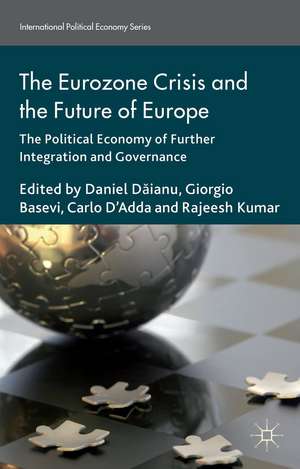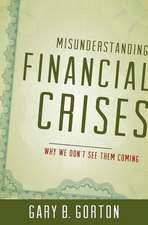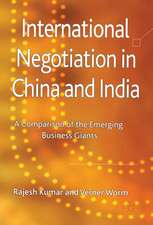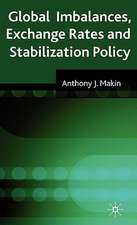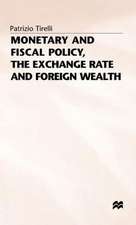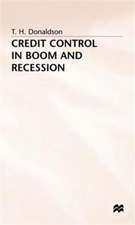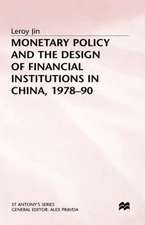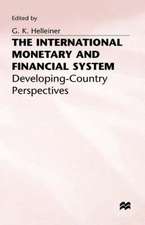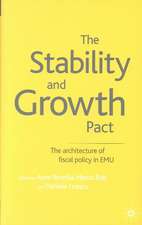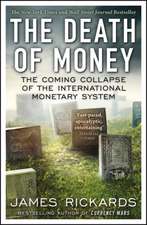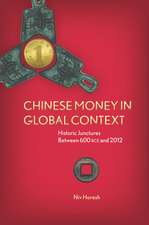The Eurozone Crisis and the Future of Europe: The Political Economy of Further Integration and Governance: International Political Economy Series
Editat de Daniel Daianu, C. D'Adda, G. Basevi Autor Rajeesh Kumaren Limba Engleză Hardback – 22 aug 2014
| Toate formatele și edițiile | Preț | Express |
|---|---|---|
| Paperback (1) | 386.61 lei 6-8 săpt. | |
| Palgrave Macmillan UK – 2014 | 386.61 lei 6-8 săpt. | |
| Hardback (1) | 394.51 lei 6-8 săpt. | |
| Palgrave Macmillan UK – 22 aug 2014 | 394.51 lei 6-8 săpt. |
Din seria International Political Economy Series
- 9%
 Preț: 831.25 lei
Preț: 831.25 lei - 20%
 Preț: 751.84 lei
Preț: 751.84 lei - 17%
 Preț: 490.25 lei
Preț: 490.25 lei - 17%
 Preț: 363.48 lei
Preț: 363.48 lei - 20%
 Preț: 690.96 lei
Preț: 690.96 lei - 20%
 Preț: 627.55 lei
Preț: 627.55 lei - 9%
 Preț: 762.80 lei
Preț: 762.80 lei -
 Preț: 430.59 lei
Preț: 430.59 lei -
 Preț: 428.68 lei
Preț: 428.68 lei -
 Preț: 147.23 lei
Preț: 147.23 lei - 20%
 Preț: 566.64 lei
Preț: 566.64 lei -
 Preț: 385.08 lei
Preț: 385.08 lei -
 Preț: 389.11 lei
Preț: 389.11 lei - 15%
 Preț: 644.30 lei
Preț: 644.30 lei -
 Preț: 389.31 lei
Preț: 389.31 lei - 15%
 Preț: 644.30 lei
Preț: 644.30 lei -
 Preț: 413.84 lei
Preț: 413.84 lei -
 Preț: 387.38 lei
Preț: 387.38 lei - 15%
 Preț: 638.89 lei
Preț: 638.89 lei - 15%
 Preț: 644.63 lei
Preț: 644.63 lei - 18%
 Preț: 893.71 lei
Preț: 893.71 lei -
 Preț: 412.47 lei
Preț: 412.47 lei -
 Preț: 325.08 lei
Preț: 325.08 lei -
 Preț: 395.47 lei
Preț: 395.47 lei - 15%
 Preț: 641.85 lei
Preț: 641.85 lei -
 Preț: 391.40 lei
Preț: 391.40 lei -
 Preț: 388.34 lei
Preț: 388.34 lei - 15%
 Preț: 640.55 lei
Preț: 640.55 lei -
 Preț: 389.70 lei
Preț: 389.70 lei - 15%
 Preț: 646.30 lei
Preț: 646.30 lei - 15%
 Preț: 637.78 lei
Preț: 637.78 lei - 15%
 Preț: 643.84 lei
Preț: 643.84 lei -
 Preț: 386.99 lei
Preț: 386.99 lei - 15%
 Preț: 641.53 lei
Preț: 641.53 lei -
 Preț: 386.81 lei
Preț: 386.81 lei - 15%
 Preț: 639.73 lei
Preț: 639.73 lei - 18%
 Preț: 944.19 lei
Preț: 944.19 lei -
 Preț: 391.40 lei
Preț: 391.40 lei -
 Preț: 330.65 lei
Preț: 330.65 lei -
 Preț: 394.12 lei
Preț: 394.12 lei -
 Preț: 386.99 lei
Preț: 386.99 lei -
 Preț: 386.81 lei
Preț: 386.81 lei -
 Preț: 387.75 lei
Preț: 387.75 lei - 15%
 Preț: 634.68 lei
Preț: 634.68 lei -
 Preț: 392.60 lei
Preț: 392.60 lei - 15%
 Preț: 641.53 lei
Preț: 641.53 lei - 15%
 Preț: 640.06 lei
Preț: 640.06 lei - 15%
 Preț: 643.16 lei
Preț: 643.16 lei - 15%
 Preț: 642.68 lei
Preț: 642.68 lei - 15%
 Preț: 641.85 lei
Preț: 641.85 lei
Preț: 394.51 lei
Nou
Puncte Express: 592
Preț estimativ în valută:
75.51€ • 82.05$ • 63.47£
75.51€ • 82.05$ • 63.47£
Carte tipărită la comandă
Livrare economică 22 aprilie-06 mai
Preluare comenzi: 021 569.72.76
Specificații
ISBN-13: 9781137356741
ISBN-10: 113735674X
Pagini: 310
Ilustrații: XIII, 310 p.
Dimensiuni: 140 x 216 x 25 mm
Greutate: 0.57 kg
Ediția:2014
Editura: Palgrave Macmillan UK
Colecția Palgrave Macmillan
Seria International Political Economy Series
Locul publicării:London, United Kingdom
ISBN-10: 113735674X
Pagini: 310
Ilustrații: XIII, 310 p.
Dimensiuni: 140 x 216 x 25 mm
Greutate: 0.57 kg
Ediția:2014
Editura: Palgrave Macmillan UK
Colecția Palgrave Macmillan
Seria International Political Economy Series
Locul publicării:London, United Kingdom
Cuprins
1. Introduction; Daniel Daianu and Rajeesh Kumar 2. Overview: Analytics of the Euro Area Crisis; Carlo D'Adda and Giorgio Basevi PART I: ECONOMIC IMBALANCES AND THE EURO AREA CRISIS 3. The Diversity of Debt Crises in Europe; Jerome Stein 4. European Sovereign debt Crisis and the Euro'; Julius Horvath and Martin Suster 5. Economic Policies and the debt/GDP Constraint: The European Challenge'; Radu Vranceanu 6. Current Account Imbalances in the Eurozone: Causes, Remedies and the Role of the ECB; Karhans Sauernheimer PART II: CRISIS MANAGEMENT IN THE EURO AREA: THE INTERPLAY BETWEEN ECONOMICS AND POLITICS 7. The Euro Crisis and German Primacy; Jonathan Story 8. The Power of Ordoliberalism in the Eurozone Crisis Management; Brigitte Young 9. Italy and the Euro; Carlo D'Adda 10. Turning a Small Problem into Catastrophe: The Case of Greece; Kunibert Raffer 11. The Eurozone crisis. A Perspective from and Impact on Asia; Pradumna B. Rana and Michael R. Blomenhofer PART III: THE EURO AREA: LOOKING INTO THE FUTURE 12. The EMU is No One-Way-Street: Back to the Roots!; Bodo Herzog 13. Changing Welfare States and the Euro Crisis; Anton Hemerijck 14. The long Term Implications of the Euro Crisis for European Integration: A Deeper Union of Fragmentation; Francesco Nicoli and Fabian Zuleeg 15; The Euro Area : Repairing A Flawed Design and Its Policy Arrangements; Daniel Daianu 16. Afterword: Summing up: The Crisis and Europe's Future; Daniel Daianu and Rajeesh Kumar
Recenzii
"As the conventional wisdom goes, the euro crisis resulted from the combination of many factors: the subprime/global financial crisis, real estate bubbles, excessive government deficits, the debts of some countries of the eurozone and so on. This book goes beyond these standard rationales. Instead, it highlights how the loss of competitiveness in Southern countries led to a widely neglected but highly influential phenomenon, namely, a sharp increase in external debt. By analyzing all aspects of the euro crisis, this work raises fundamental questions about the relevance and sustainability of the euro for a group of countries whose competitiveness and unit labour costs vary so widely. This book makes a valuable contribution by offering a unique perspective on efforts to understand the euro crisis." - Serge Rey, University of PAU
"This volume examines the eurozone crisis in depth, from all points of view, and in a scholarly manner (but intelligible also by the layman). A gem is the chapter by the late Jerome Stein on the diversity of debt crises in Europe, based on his NATREX model. I highly recommend this book not only to professionals, but also to the general public of interested persons." - Giancarlo Gandolfo, Accademia Nazionale dei Lincei, Rome, Italy
"This volume examines the eurozone crisis in depth, from all points of view, and in a scholarly manner (but intelligible also by the layman). A gem is the chapter by the late Jerome Stein on the diversity of debt crises in Europe, based on his NATREX model. I highly recommend this book not only to professionals, but also to the general public of interested persons." - Giancarlo Gandolfo, Accademia Nazionale dei Lincei, Rome, Italy
Notă biografică
Anton Hemerijck, VU University Amsterdam, The NetherlandsBodo Herzog, Reutlingen-University, GermanyBrigitte Young, University of Muenster, GermanyFabian Zuleeg, European Policy Centre, BelgiumFrancesco Nicoli, European Policy Centre, BelgiumGiorgio Basevi, University of Bologna, ItalyJerome L. Stein, Brown University, USAJonathan Story, INSEAD, FranceJulius Horvath, Central European University, HungaryKarlhans Sauernheimer, Johannes Gutenberg-University, GermanyKunibert Raffer, University of Vienna, AustriaMartin Suster, National Bank of Slovakia, BratislavaMichael R. Blomenhofer, Kroll, SingaporePradumna B. Rana, Nanyang Technological University, SingaporeRadu Vranceanu, ESSEC Business School, Paris, France
